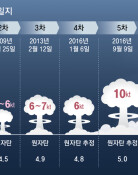Spy sentenced for collecting data on Lee Myung-bak, relatives
Spy sentenced for collecting data on Lee Myung-bak, relatives
Posted April. 26, 2011 03:15,
The National Intelligence Service is known to have secretly investigated in 2007 the then Grand National Party`s presidential candidate Lee Myung-bak by forming a task force ahead of the presidential election that year.
According to a lower court ruling against an intelligence official identified only by his surname Goh, he collected personal information about 131 people on 563 occasions from August to November 2006. The official was indicted for secretly investigating Lee and many of his relatives and acquaintances in violation of the National Intelligence Service Act.
The Seoul Central District Court on April 7 sentenced Goh to one year in prison with a stay of execution for two years.
○ Close probe into Lees relatives
According to the ruling, Goh, then a grade 5 agent with the current affairs assistance team of the spy agency`s cooperation division, was told by the then chief of the ruling Democratic Partys organization bureau in June 2006, "(Then) Seoul Mayor Lee owns property in the names of his brother-in-law and confidants at a site near the Supreme Court building in Seoul`s Seocho ward.
Goh collected data on land and home ownership, income and the social security numbers of Lees relatives, including his eldest brother Sang-eun, second eldest brother and ruling Grand National Party lawmaker Sang-deuk, and Lees aides as well as wife Kim Yoon-ok.
Goh gathered the data from the then Government Administration and Home Affairs Ministry, the Construction and Transportation Ministry and the National Policy Agency through staff in the spy organization`s intelligence management division.
He gathered 563 cases of data from these agencies. The secret investigation covered far-reaching targets including Lees brother-in-law (his younger sisters husband), the husband of Rep. Lees second daughter, his third daughter, and Kim Yoon-oks second elder sister.
The targets also included Shin Hyun-song, former international economy adviser to Lee who is now a professor at Princeton University in the U.S., and Kim Baek-joon, chief of the general affairs planning team at the presidential office in Seoul.
The probe was conducted before the stock scandal of the investment advisory firm BBK erupted. Notably, however, the targets included Lee Bo-ra, the wife of former BBK President Kim Kyung-joon, who is now in prison, his father-in-law Lee Doo-ho, and BBK staff.
Goh reportedly compiled data collected from his probe, prepared a 42-page report titled, The Status of Property Owned by CEO Lee (referring to Lee Myung-bak) in November 2006, saved it on his personal computer, and frequently checked it.
○ Who backed Goh?
During the criminal probe and trials, Goh said he referred to the data after winning approval from his immediate superior and that he reported his findings several times afterwards.
His boss said, however, I only overheard comments on rumors that Lee Myung-bak`s real estate owned by people with borrowed names existed behind the Supreme Court building in Seocho-dong, and only instructed Goh that he need not to be too aggressive or does not need to probe if conditions are tough.
The boss`s claim was in stark contrast to what Goh said. With conflicting testimonies and no clear evidence, the court stopped short of making a judgment over whether someone in the higher chain of command at the spy agency was involved in the secret probe.
No clear conclusion was also made on if data Goh secured was handed over to the political circle. Prosecutors found that he held several phone conversions and often dined from July to November 2006 with the chief of the Democratic Partys organization bureau, who broke the news of the probe. They failed to detect whether the data was handed over to the bureau chief, however.
○ Question of guilt
During the trial, the National Intelligence Service was found to have submitted a paper to the court suggesting that detection of corruption by civil servants is within the boundaries of the spy agency`s legitimate intelligence gathering activities.
When Goh claimed his innocence by saying, Gathering data on civil servants corruption is part of the rightful duties the National Intelligence Service is tasked with, the agency submitted the paper to that effect.
The paper could be construed as the agencys backing of Gohs secret probe into Lee and his relatives, but the agency apparently presented the paper probably because it believed it could not afford to exclude gathering data on corruption by civil servants from the scope of its domestic intelligence activities.
The court had a different opinion, however. Since the National Intelligence Service could violate or stand a high chance of violating basic civil rights in the course of executing its mission, the National Intelligence Service Act clearly defines the scope of its duties, adding, Information gathering activities meant to detect corruption by civil servants or misdeeds cannot be construed as being part of an intelligence agent`s duty.
Furthermore, Gohs actions constituted illegal activities aimed at gathering personal information on a promising presidential candidate irrespective of activities meant to collect data on corruption of civil servants.
baltika7@donga.com
Headline News
- S. Korea, US agree on defense const sharing-plan US presidential election
- Medical school quota discussions spark confusion 40 days before exam
- Zuckerberg surpasses Bezos to become world’s second richest person
- Son excluded from October national team due to thigh injury
- Ruing and opposition leaders launch campaigns ahead of by-election







